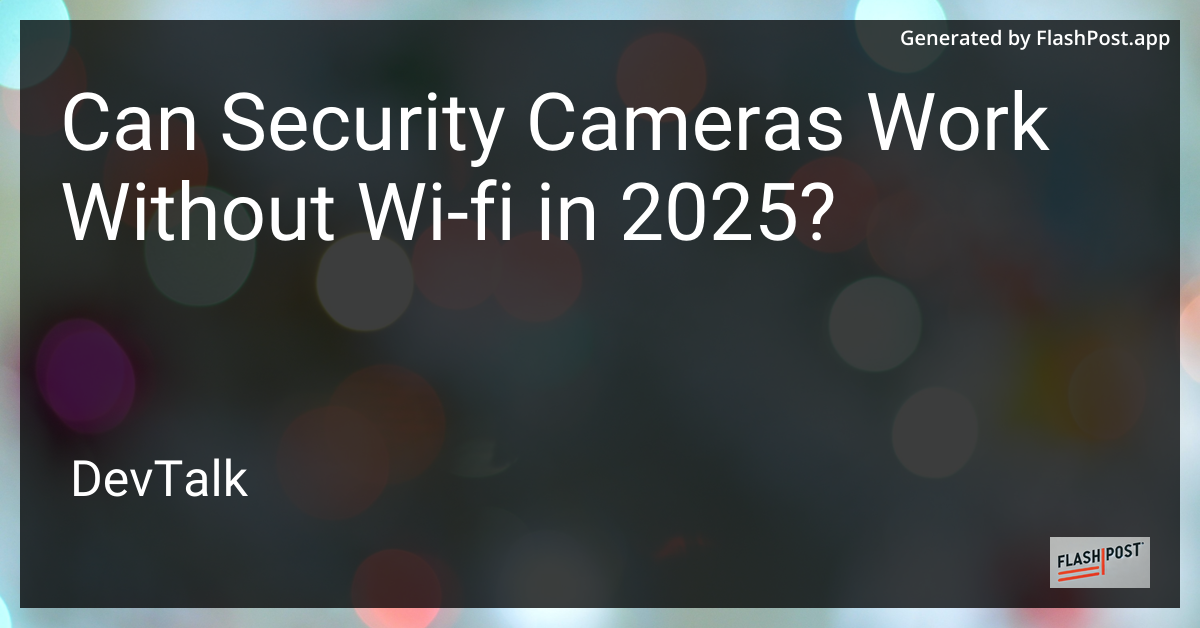Can Security Cameras Work Without Wi-fi in 2025?

Can Security Cameras Work Without Wi-Fi in 2025?
In the rapidly advancing world of technology, security systems have continually evolved to meet the demands of consumers.
A common question today, especially as we approach 2025, is whether security cameras can function without Wi-Fi. As surprising as it may seem, not only do these cameras exist, but they also offer a range of benefits for specific needs and situations.
How Do Security Cameras Work Without Wi-Fi?
Wired Cameras
Wired security cameras are one of the most reliable systems available. They connect directly to a recording device, typically a digital video recorder (DVR), using cables. This setup ensures that the footage is consistently transmitted and stored without reliance on a network. In scenarios where a stable and high-quality video feed is critical, wired cameras are a great option.
Cellular-Based Cameras
Over the years, cellular-based security cameras have gained popularity. These cameras use a cellular network to transmit footage, much like mobile phones. They’re perfect for locations where Wi-Fi is unreliable or absent. As cellular technology evolves, their reliability and speed are expected to improve, making them a viable option in 2025.
Battery-Powered Cameras with Local Storage
For those looking to avoid any network dependency, battery-powered cameras with local storage (such as SD cards) offer a hassle-free option. These devices are often used in remote or off-grid areas and are simple to set up. Although they lack real-time monitoring capabilities without a Wi-Fi connection, they excel in recording events and allowing users to review footage later.
Advantages and Limitations of Non-Wi-Fi Cameras
Advantages
- Reliability: Without reliance on Wi-Fi, these cameras are immune to network outages.
- Installation Flexibility: They can be installed in locations that lack internet access, such as remote cabins or new construction sites.
- Security: With hacking attempts on the rise, non-Wi-Fi cameras offer an extra layer of security by being offline.
Limitations
- Lack of Remote Access: Most non-Wi-Fi cameras do not support live streaming or remote access without a network connection.
- Data Storage: Depending on the type, there might be limitations on storage capacity and the need for manual data retrieval or replacement.
The Future of Security Cameras Without Wi-Fi
Technology is on a fast trajectory of innovation. By 2025, advancements in technology are likely to produce even more sophisticated security solutions, enhancing features such as longer battery lives, increased storage capacities, and more robust cellular technologies. As consumer demands grow, so too will the capabilities of security cameras designed to work independently of Wi-Fi.
For those considering a security upgrade, exploring various systems can be a smart move. Check out some affordable hidden security cameras to find great deals. Additionally, if you're weighing the benefits of installing security cameras, now is an excellent time to plan for a more secure future.
Conclusion
As we transition into 2025, the demand for versatile security cameras that operate without Wi-Fi is expected to grow. Whether opting for wired, cellular-based, or battery-operated solutions, consumers have a range of options that cater to their specific needs. Understanding the advantages and limitations of each can guide consumers in making the best decision for their security requirements.
No matter what your preference, securing your home or business with the right technology is paramount to ensuring peace of mind and safety.